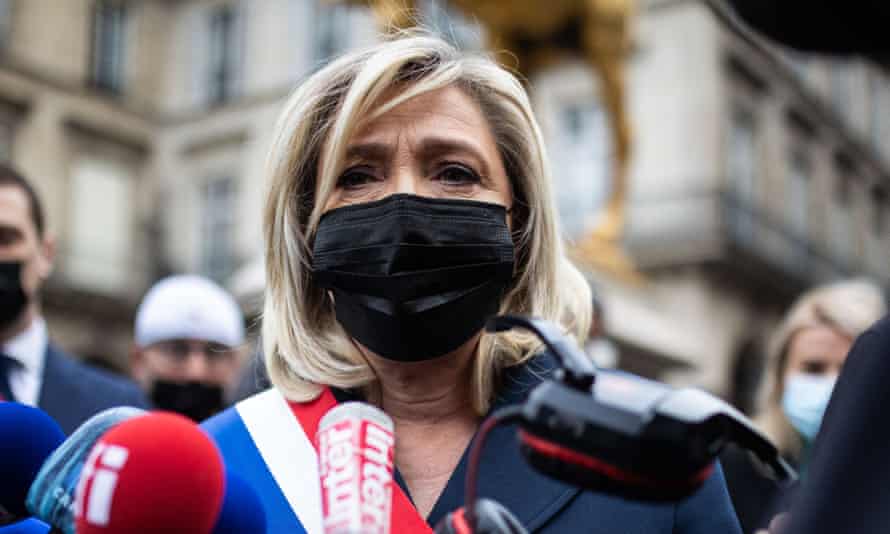Fears of a coup in France are exaggerated, but a far-right president is a real possibility

A
Marine Le Pen, the leader of the far-right Rassemblement National party, endorsed the generals’ call. A survey by Harris Interactive, which found that 58% of respondents agreed with the open letter’s statements, stoked further fear. This gives the impression that the far right is stronger than ever. Some political pundits go as far as to say that while Macron is predicted to win another term in 2022 against Le Pen, there’s a very real possibility that Le Pen will win by a small margin, sending a thunderstrike across the world.
Or maybe the whole story is a little bit exaggerated. Here’s why.
There’s nothing new in a sizeable segment of the military holding far-right beliefs and voting accordingly. In 2017, Le Pen took as much as 65% of the vote in areas close to barracks, compared to 33.9% nationwide. The older retired officers – like Martinez, 72, and Piquemal, 80 – are haunted by memories of the 1940 French surrender to the Nazis, the army’s defeats in Indochina and Algeria, and the 1968 leftist riots, which they see as the swan song of a more traditional France. The paratroopers, the foreign legion and the marine infantry units, from which many who signed the open letter hail, are especially known for their staunchly conservative patriotism.
However, the defence ministry quickly reacted to the publication of the letter with disciplinary sanctions against those signatories who were on active duty. There were only 18 such officers and soldiers, an insignificant number compared to the 270,000 civilian and military personnel who currently serve. General Martinez, who was born in Algeria, launched the rightwing movement Volunteers for France, and plans to stand as a candidate in the 2022 presidential election, although it’s uncertain whether he will meet the necessary criteria to run. His main rallying call is the fight for traditional French identity, which he says is threatened by “Islamisation”, multiculturalism and antiracism.
General Piquemal, who began his career in 1962, when Algeria became independent, founded a political movement named “Cercle des citoyens-patriotes” (or Circle of Patriotic Citizens) after he retired. He was thrown out of the reserve army in 2016 for taking part in a banned demonstration against immigration in Calais. Contrary to the suggestion contained in some of the overexcited reporting of the letter, the group of generals doesn’t have the technical capacity to engineer a coup. This would require the support of active-duty soldiers, at least the passive support of a few politicians and the complicity of a segment of the higher state administration.
That the letter appeared in the 21 April issue of the weekly rightwing magazine Valeurs actuelles, on the 60th anniversary of the failed 1961 coup staged against Gen Charles de Gaulle in Algiers added to the suggestion the open letter was announcing imminent military action. But it’s not: the 1961 coup involved hundreds of the most seasoned generals and officers on active duty, and the active involvement of four elite units of what is known today as the special forces. The purge ordered by Gen de Gaulle against the felonious supporters of French Algeria was so strong it left many scars and bad memories within the military community, so much so that would-be putschists will probably think twice before they go to the streets in arms.
However, there’s much to worry about when 58% of the population seemingly think the country is on the brink of collapse and Le Pen is predicted to poll up to 48% on the second ballot of the presidential election. The Harris survey, which found that 49% of respondents would support the army seizing power, comes at a time of distrust of the president, who finds himself taking the blame for what he and his predecessors have failed to achieve: stopping Islamist terrorist attacks and tackling crime.
The Harris survey was published a few days after an Islamist radical killed a female administrator in an attack on a police station. It also followed a huge crowd of 20,000 demonstrating in Paris, demanding that the murderer of Sarah Halimi, an Orthodox Jewish woman, stand trial, despite a higher court ruling that he was insane and should instead be sent to a mental-health institution. The ruling sparked outrage, as the murderer was known to hold antisemitic views and shouted “Allahu Akbar” as he killed his victim. Around the same time, a gang of thugs who had set fire to a police car in the suburbs of Paris, inflicting life-changing burns to two officers, received mild sentences, with some of the members even being released without charge. Those events were interpreted by the Rassemblement National and the Conservative right as proof that French legislation and French magistrates were too lenient, and that immigration and crime were linked, an idea that the left and the centre-right cabinet rejects.
The situation in France was best assessed in a study by the progressive thinktank, the Fondation Jean-Jaurès, which concluded that Marine Le Pen may win in 2022, provided she continues to become more mainstream: only 34% have a very negative opinion of her, an all-time low. She would also need conservative right voters to back her on the second ballot, against Macron, and for Macron’s popularity to continue to decline. In other words, while France is not ripe for a coup d’état, the coming to power of a far-right president, elected with the votes of conservatives, is a definite possibility.

Geen opmerkingen:
Een reactie posten
Opmerking: Alleen leden van deze blog kunnen een reactie posten.